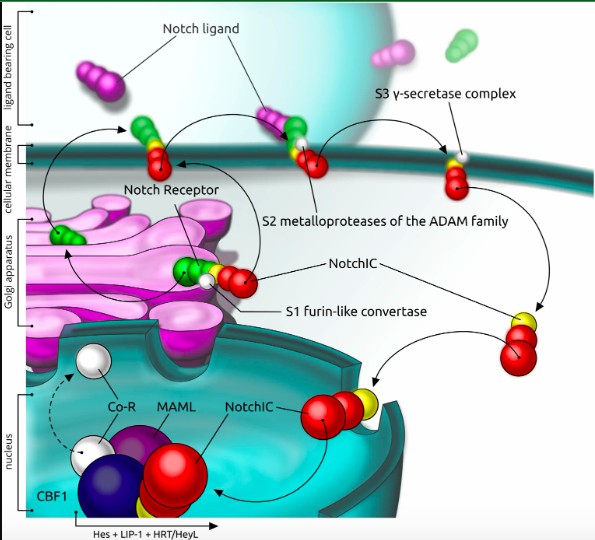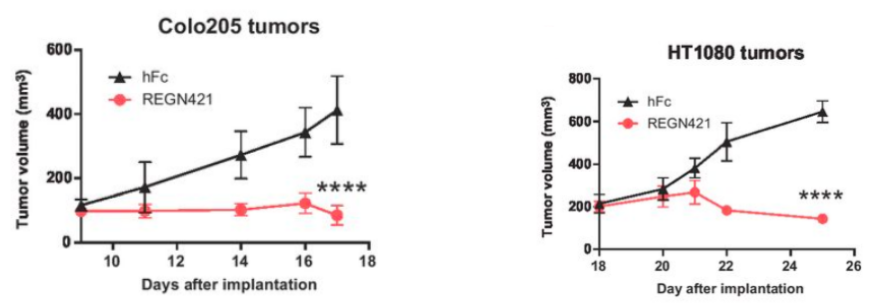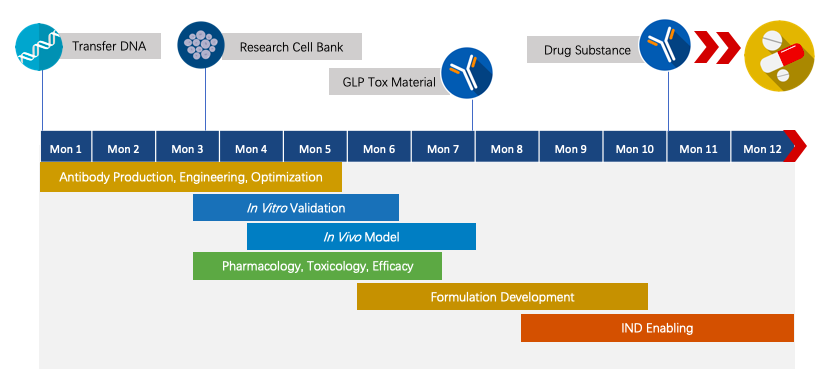About This Program
This program aims to develop anti-DLL4 therapeutic monoclonal antibody for immuno-oncology.
Rationale when developing the program:
-
DLL4 is a protein-coding gene that acts as a ligand for Notch receptors 1 and 4. Notch signaling pathway is highly important to the maintenance and proliferation of cancer stem cells (CSCs).
-
DLL4 that expressed by bone marrow cells, including macrophages and dendritic cells, is involved in adaptive immune response regulation.
-
The role of DLL4 in angiogenesis has been studied and is considered to be an anti-angiogenic agent.
-
The DLL4-Notch pathway not only enhances VEGF activity on tumor cells but also promotes VEGF expression, stimulates tumor angiogenesis, and promotes tumor growth/invasion.
-
When the body experiences hypoxia, an abnormal DLL4 expression is induced, and increasing microvessel density (MVD) will be found.
DLL4
DLL4 is one of the three delta-like ligands in the mammalian genome that regulates the activity of the Notch receptor acting as agonist ligand. DLL4 contributes to normal development and tissue homeostasis and is required for the normal development in the immune system, gastrointestinal tract and vascular system.
Highlighted Functions:
-
In vitro signal transduction studies have shown that DLL4 can easily pass through four human Notch receptors, suggesting its potential in many of the bodily functions that categorized by the Notch family.
-
Dll4-Notch signaling pathway can be blocked by selective neutralization of Dll4 antibodies or soluble Dll4 fusion proteins.
-
Dll4 acts to the downstream of VEGF, but Dll4-mediated Notch signaling inhibits the action of VEGF. Antagonizing Dll4 or VEGF signaling leads to tumor growth inhibition.
 Fig.1 Dll4/Notch signalling pathway.2
Fig.1 Dll4/Notch signalling pathway.2
DLL4 in Cancer Studies
Here are some published data about DLL4 working as a potential target for cancer immunotherapy.
-
Anti-DLL4 antibody (REGN421) treatment reduces tumor growth for HT1080 or Colo205 tumors.
 Fig.2 The average tumor volume line graphs of humanized Dll4 SCID mice bearing established HT1080 or Colo205 tumors over the courses of treatment.1
Fig.2 The average tumor volume line graphs of humanized Dll4 SCID mice bearing established HT1080 or Colo205 tumors over the courses of treatment.1
-
Dll4-Notch inhibition-altered tumor growth in mouse PlGF+ Lewis lung carcinoma (LCC) tumors.
 Fig.3 Tumor growth rates of vehicle (VT)–, DAPT-, and anti-Dll4 antibody–treated vector-LLC and PlGF-LLC tumors.3
Fig.3 Tumor growth rates of vehicle (VT)–, DAPT-, and anti-Dll4 antibody–treated vector-LLC and PlGF-LLC tumors.3
Ongoing Clinical Trials
-
Currently, several anti-DLL4 therapeutic monoclonal antibodies are being evaluated in clinical trials. Cumulative preclinical data demonstrate its important role in cancer progression; however, safety, efficacy, and combination strategies require further confirmation.
-
Sufficient rationale for us believes that DLL4 is still a compelling target for cancer immunotherapy. In an effort to optimally leverage DLL4-mediated immune response, our next generation of DLL4 targeting treatment attempts to explore combination therapy trials with other immunomodulatory agents.
Program Planning and Management
Creative Biolabs has extensive knowledge in end-to-end program development. For each program, we are committed to delivering the final complete program to our clients within 1.5 years before entering the IND stage.
 Fig.4 Project pipeline management of therapeutic monoclonal antibody.
Fig.4 Project pipeline management of therapeutic monoclonal antibody.
Cooperation
Creative Biolabs is looking for potential partners (include but not limit to major pharma or biotech firms) to develop anti-DLL4 therapeutic monoclonal antibody program together. Our scientists are dedicated to bringing years of valuable experience to our partner and achieve a meaningful partnership. For any partners interested in our Next-IO™ programs, Creative Biolabs welcomes collaboration.
Here are two ways for your choice, and please contact us for more details.
1) Collaborate with us and co-develop the programs from the discovery phase to IND enabling. Costs will be shared.
2) Become a licensed candidate for our programs.
With our quality control protocol and knowledge of global regulatory requirements, we can help our partners advance their programs with more chance to succeed. Look forward to cooperating with you in the near future.


 Fig.1 Dll4/Notch signalling pathway.2
Fig.1 Dll4/Notch signalling pathway.2
 Fig.2 The average tumor volume line graphs of humanized Dll4 SCID mice bearing established HT1080 or Colo205 tumors over the courses of treatment.1
Fig.2 The average tumor volume line graphs of humanized Dll4 SCID mice bearing established HT1080 or Colo205 tumors over the courses of treatment.1
 Fig.3 Tumor growth rates of vehicle (VT)–, DAPT-, and anti-Dll4 antibody–treated vector-LLC and PlGF-LLC tumors.3
Fig.3 Tumor growth rates of vehicle (VT)–, DAPT-, and anti-Dll4 antibody–treated vector-LLC and PlGF-LLC tumors.3
 Fig.4 Project pipeline management of therapeutic monoclonal antibody.
Fig.4 Project pipeline management of therapeutic monoclonal antibody.
 Download our brochure
Download our brochure